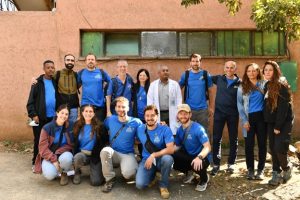International Center for Biosaline Agriculture’s (ICBA) Rehabilitation and Management of Salt-affected Soils to boost Agricultural Productivity in Ethiopia and South Sudan (RAMSAP) Project has improved the livelihood of many rural and pastoral communities in salt-affected areas of Ethiopia during the first phase of the four year project.
The project findings show that about 80 percent of irrigated areas in Ethiopia are affected by soil salinity, where production loses are ranging from 10-80 percent contingent on the soil salinity levels. Use of poor-quality water for irrigation, poor on-farm water management practices and lack of adequate drainage facilities are the main reasons behind the surge of the soil salinity problems.
A 28 years old young farmer Mohammed Musa in Amibara district of the Afar Regional state -Ethiopia, shares his experiences on how the soil salinity affects his district. “I grew up in this area, my families used to produce Maize and some export crops such as cotton, citrus fruits, onion, and vegetables through irrigation,” he said. “They used to produce up to 150 quintals of onion from a small plot of land. However, at some point, they could not harvest even 40 quintals from the same land due to the increasing soil salinity problem.”
Mohammed added that ICBA’s project
came when the situation has reached a critical point in the area – agricultural lands were abandoned and farmers became frustrated and halted their usual agricultural practices due to soil salinity.
Following the introduction of RAMSAP, in 2016, sudden changes are being observed. The project has been implemented to contribute to poverty reduction through the introduction and promotion of integrated crop-livestock systems, improved irrigation, and crop management practices. All are biological methods to mitigate the problems. Four types of grasses (Rhodes grass, Sesbania,
Panicom, Cinchrus) and six salt-tolerant crops (Barely, Sorghum, Quinoa, cowpea, Lablab, Pearl Millet) were planted on the farmers’ plots and research points. Both researchers and farmers observed that the situation quickly started to improve the infertility of the lands as witnessed in the trial sites.
“Before ICBA’s interventions, whatever we planted, it wouldn’t germinate, or the yield was very poor. I planted onion in my plot and harvested only 35 quintals. After the adoption of the technology, I planted again the same crop in the same plot and harvested gained 80 quintals,”
said Mohammed Musa.
All the farmers engaged in the project have experienced similar situations. Now, they started to plant the major crops and fodder and are generating more income. In general, ICBA has ignited a glimmer of hopes for rural pastoralist communities in areas affected by soil salinity by enhancing stable crops and fodder production, while rehabilitating their lands. The project has been implemented in five regional States (Afar, Amhara, Oromia, Tigray, and Somali) of Ethiopia since 2016.
Dr. Asad Qureshi, ICBAs RAMSAP Project Leader said that, in addition to treating soil salinity, the project has contributed significantly to improve forage varieties to feed and increase livestock productivity in lowland areas of the country. The seeds of the recommended varieties of the selected crops are now being multiplied for free distribution to farmers in all five regions. The project is also organizing training and demonstration plots to educate farmers about these crops.
International Center for Biosaline Agriculture (ICBA) is an International, non-profit agricultural research center. Head Quarter in Dubai, UAE, it works towards achieving food, nutrition and water security, in saline and marginal environments around the world. ICBA has developed a variety of methods of Bioremediation in order to bring salt-affected lands back into agricultural use.
The Ethiopian Herald June 21,2020
BY ENAWGAW SISAY





